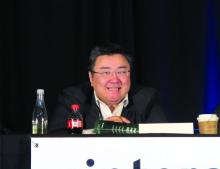“Blockade of semaphorin 4D with pepinemab, we think, helps relieve this suppressive environment and actually seems to stimulate infiltration of T cells and improve T-cell activity in these tumors,” he added. He went on to explain that the mechanism of action is believed to generally be through suppression of myeloid cell trafficking to the tumor and myeloid cell cytokine secretion.
Further, and more importantly for cancer immunotherapy, preclinical models suggest that anti–semaphorin 4D antibodies are synergistic with various checkpoint inhibitors, including the PD-L1 inhibitor avelumab and others, Dr. Shafique said.
Indeed, these early CLASSICAL-Lung trial findings “do support the mechanism of action being reversing this myeloid-induced suppression in the microenvironment and improving T-cell infiltration and activity,” and they support a potential benefit of combining anti–semaphorin 4D antibodies and checkpoint inhibition in advanced NSCLC after progression on prior therapy, Dr. Shafique added.
Invited discussant Timothy A. Yap, MBBS, of the University of Texas MD Anderson Cancer Center in Houston, said that “inhibition of [semaphorin 4D] promotes functional immune infiltration into the [tumor microenvironment] and, therefore, is a rational way of inhibiting tumor progression” in NSCLC and other cancers.
The CLASSICAL-Lung trial “didn’t escalate all the way to the [maximum tolerated dose] but did demonstrate durable on-treatment increases in CD8-positive T-cell infiltration, including in 79% of patients with low or null PD-L1 expression, as proof of mechanism,” Dr. Yap said, noting the responses in both immunotherapy-naive and immunotherapy-resistant patients.
“So I guess the key question will be, ‘Is this an active combination in NSCLC?’ ” Dr. Yap said. “In my opinion, yes it is, but is it going to be enough to take it past registration?”
Next steps
As next steps for the investigators, Dr. Yap suggested looking at a more specific population of PD-L1–low or –null immunotherapy-resistant NSCLC patients, considering adding a chemotherapy agent to the pepinemab/avelumab combination, or perhaps going “straight to a randomized phase 2/3 trial [comparing the combination with] pembrolizumab.”
“The investigators should also consider other tumor types beyond non–small cell lung cancer with this particular combination,” he said.
The preclinical data with respect to the anti–semaphorin 4D antibody suggest that study in combination with other agents, such as anti–CTLA-4 agents or anti-LAG3 agents, is also warranted, Dr. Yap added, noting that triplet combinations might also be worth investigating.
The CLASSICAL-Lung trial is funded by Vaccinex and Merck. Dr. Shafique reported a consulting or advisory role with GlaxoSmithKline. Dr. Yap reported relationships with numerous pharmaceutical companies, including Merck. MD Anderson’s Institute of Applied Cancer Science, where Dr. Yap serves as medical director, has a commercial interest in DNA damage response inhibitors and other inhibitors.
SOURCE: Shafique MR et al. ASCO-SITC 2020, Abstract 75.

